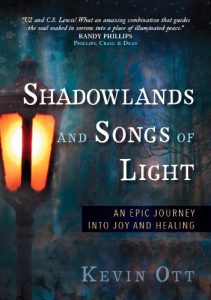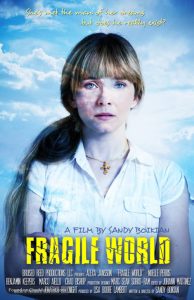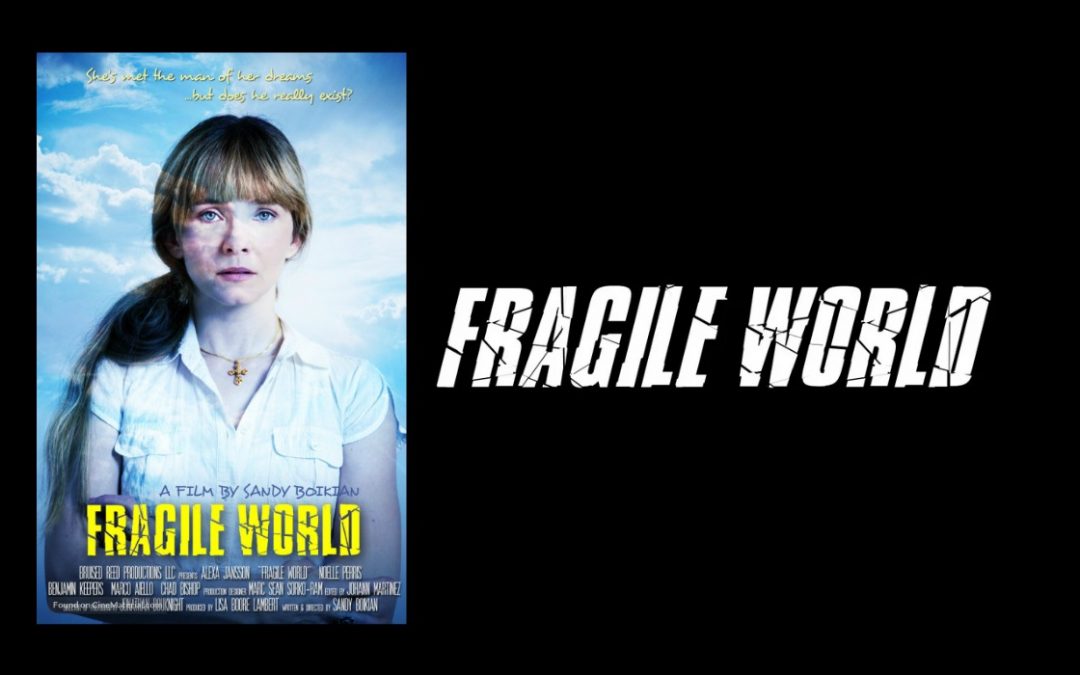 Quick note for fans of C. S. Lewis and/or U2 before the article begins:
Quick note for fans of C. S. Lewis and/or U2 before the article begins:
When life’s sorrows bring us into shadowlands, we need the joy of Christ to restore our strength. We tap into this joy by nurturing a deeper longing for God. Shadowlands and Songs of Light: An Epic Journey into Joy and Healing takes you on a quest for joy and a life-changing longing for God.
Written by a C. S. Lewis expert and a skilled composer, the book explores 18 beloved C. S. Lewis classics, from Narnia to Mere Christianity, and 13 spiritual principles behind the art of songwriting, as seen in 13 studio albums by U2–all to answer one question: how do we experience deeper joy in our relationship with Christ during times of sorrow and trial?
Shadowlands is available to pre-order at Amazon or ChristianBooks.com. If you pre-order a copy, the author will personally email you with a thank-you note and a copy of his upcoming e-book devotional “Devotions with Tolkien,” which uses J. R. R. Tolkien’s epic “The Lord of the Rings” and Scripture. (This is all on the honor system: simply pre-order Shadowlands, and then send an email to shadowlands2016 (at) gmail (dot) com letting the author (Kevin Ott) know you’ve ordered it, and he will contact you.)
Text LIGHT to 54900 to get a preview of Shadowlands and Songs of Light.
***
 [Parent’s Content Advisory at bottom of review.]
[Parent’s Content Advisory at bottom of review.]
From IMDB, the plot for Fragile World: “A lonely interior decorator with a history of delusions falls for a dashing stranger who may or may not be real.”
I love finding new movies–like “Fragile World”–that may not be mainstream fodder at the box office, but they’re just as moving and impactful as some of my favorites I’ve seen on the big screen this year. Many movie professionals, especially the veteran directors, are mourning the state of the film industry today. Everything is a sequel, and everything is a franchise expansion on some cinematic universe that does not hide its intentions to make as much money as humanly possible.
But I think we live in a fantastic era of movie making, especially now that so many people other than Hollywood elites and major studios are saturating the film industry and making quality indie projects. Sure, indie films have been around since the beginning, but the indie film world is now like a sprawling garden, growing across the usual dividing lines of culture and becoming a passion for many communities, not just the more radical Sixties-inspired art-house stereotypes. So many indie films over the decades have sprouted from an exclusive humanistic worldview (i.e. human reasoning is the highest authority) or some amalgamation of that belief system that embraces immanence and existential despair and rejects transcendence (i.e. the belief that there is something more than this world and this life we are living, and that we should shape our lives now with that “something more” in mind).
It is therefore fascinating to see people of faith who (gasp) believe in quaint ideas like absolute truth and transcendence over immanence, and an infinite, extra-natural Being (aka God) who knows us and draws near to us.
Take “Fragile World,” for example, written and directed by Sandy Boikian. An unabashed Christian worldview informs the story–and I appreciate that, no doubt–but I am not praising the film simply for that reason. “Fragile World” does some things well that many big budget secular name-brand movies have done poorly or not done at all. We’ll get into that first, and then talk about the film’s deeper layers of meaning. You might say this style of film review is loosely based on the inductive method of study: observe, interpret, and apply.
(Observations) Entertainment Value and Film Craft
 I won’t give any spoilers away, but this film’s screenplay, especially the third act, bobbed and weaved around my ability to predict what the film will do next. I was genuinely surprised at the ending, and that in itself was a delight. It is very hard to surprise audiences these days, frankly.
I won’t give any spoilers away, but this film’s screenplay, especially the third act, bobbed and weaved around my ability to predict what the film will do next. I was genuinely surprised at the ending, and that in itself was a delight. It is very hard to surprise audiences these days, frankly.
But the ending of “Fragile World” was not only surprising and riveting, it was satisfying. Many films excel in the “riveting” part but then forget to be satisfying too. To be honest, most box office so-called blockbusters fail to pull a satisfying ending off–at least one as good as “Fragile World.” Good endings really change the way you experience the whole movie, which then makes the film deserving of multiple viewings (as any good piece of art should do). Films and books are not meant to be disposable like a can of soda that you discard after you’ve finished it–at least not the good ones. They’re meant to be re-tasted and re-enjoyed.
In fact, I would make this recommendation: after you see this film once, go back and watch it again, especially the opening sequences. It gave me chills.
The actors did a marvelous job as well, and actress Chloe Russell (listed as Alexa Jansson in the credits) really shined in her performance as Rosalie. She brought the sadness, confusion, angry despair, and childlike hope of Rosalie right to the forefront of the viewing experience, and she did it in a plausible way that kept your eyes glued to the screen to see what would become of her. There was particularly good chemistry between her and Benjamin Keepers (who played August); and all of the cast members, from Chad Bishop to Noelle Perris, are performers I’d love to see in more films. And several scenes–from the surprising moment when Fitz (Marco Aiello) visited a group of elderly people to the film’s ending–moved me to tears.
Another thing I love about indie films: you discover amazing performers who are just as good as the A-Listers, but these new performers haven’t been in a zillion movies yet so it’s easier to get into their character. The same A-Listers seem to be in every other movie that comes out these days. It’s to the point where their “brand” overshadows their character.
(Interpretation) Redemption Storylines, Worldviews, Edifying Themes
I can’t go too deep into interpretation without giving spoilers away, so I will avoid certain topics that could easily be explored. Instead I’ll just say this: yes, this film speaks about Christianity openly, and, yes, this will likely turn off any viewers who harbor a strong hostility toward anything Christian or religious; yet everything this film says about faith and God is not spoken in the dialogue. There is some strong subtext in there.
For example, there is a possible symbolism between Rosalie and her love interest August that could easily serve as a metaphor of the journey through faith and doubt, where we sort out what is real and what is not real in our spiritual lives.
Sadly, in this post-Christian age of the West, it now takes quite a bit of boldness to even insist there is anything real to be found at all. Faith is not about willing unicorns to exist by the sheer force of our desire. It is not blind faith (as one character says in a scene). It is faith born from experience and reason. We see an example of this in the Book of Acts, when the apostles are testifying boldly about Jesus. When the authorities order them to stop, they cry out that they could never stop talking about what they’ve seen and heard. Two thousands years later, people are still seeing and hearing the mighty acts of Jesus Christ–and I do mean that literally, that Jesus is alive and supernaturally involved in people’s lives today–and in the end we are all witnesses in a court room testifying about undeniable experiences we’ve had. The heart of Christianity is a Living God–not an abstract idea or cold, distant father-figure/archetype–who seeks you out to have a personal relationship with you in experience and truth. Sure, this relationship with God includes intellectual pursuits (i.e. theology, philosophy, metaphysics, etc.), but it also includes experience. Christ reveals Himself in experience as well as in understanding.
And this film has quite a bit to say about all of the above. In some ways, it really gets to the heart of the matter for some of us, whether we’re Christians or non-Christians, during those darker moments of life when we ask God (or “the Universe” if we don’t yet believe in God or we’re not sure), “Am I really worth anything? Is it insane to think that I have any value to You? Is it delusional for me to expect anyone, especially You, God, to love me or to think that I am worth loving?”
Some people struggle with that question every day while others have hardened their hearts and toughened their skins and say, “Just get over it!”–the cynical, we’re-worth-nothing-we’re-not-made-in-God’s-image-so-just-accept-it-and-stop-complaining route of films like “Fight Club” and others.
“Fragile World” approaches that question with a tender heart, even while it takes a hard look at the mind’s power to chase after phantoms and idols.
Besides any symbolism, there are some closer-to-the-surface layers of “Fragile World” that moved me–particularly the mental health angle. This film did an excellent job in its portrayal of mental illness. Far too many movies, including mainstream movies, resort to hyperbole. They resort to extremes. This film shows the mixed humanity of a person who struggles with that kind of illness. People who battle mental illness often function normally in many areas of their lives. The illness, in other words, is not their entire identity, and it’s not an impossible prison that keeps every facet of their being under lock and key. This film shows a more rounded look at the common humanity that exists in someone who has a mental illness.
Conclusion (and Application): ‘Fragile World’ is Filled with Hope, not Despair (And We Should Be Hopeful Too)
Anyone who lives to be an adult in this fallen world will experience a broken heart–one way or another. As one character in the film says, “Sometimes what we call wonderful cuts us so deep it leaves long lasting scars.” But then in a later line, we hear, “There’s no wound too deep that God can’t heal.”
What I love about “Fragile World” is that it doesn’t obsess over the pain in Rosalie’s heart using the “edgy” hyperbole so common in the films of our generation where the writer feels an incessant itch to turn the character’s illness into a shocking spiral of gratuitous darkness. Yes, there is the “heart of darkness” in the world, and many people have fallen into indescribable horrors. But many people have not. If the post-Christian art-house corner of Hollywood were our barometer for reality, we would believe that every mental illness spirals into utter most darkness and every sorrow in the world is forever bleak and incurable. Hollywood sometimes mistakes the shock and bleakness of a despairing worldview for art.
That being said, the film also doesn’t underestimate or sugar-coat Rosalie’s brokenness; in fact, the film throws open a cellar door to reveal how that brokenness was far more broken than anyone realized. So it is with us. We don’t know the extent of our own brokenness, but God does. This film pointed me toward that hope: that God really does know us and He knows how to heal us. I’m looking forward to what director Sandy Boikian does next. More please!
You can check out the official website for “Fragile World” here, go to its Facebook page here, or order the DVD (and set up church screenings) here.
Want to read more reviews like this one? Sign up for our email alerts and get notified when we post a new review.
Content advisory for this film…
Sexual Content/Nudity/Themes of Sexuality: None.
Violence/Gore/Scary Content: None.
Language: None.
Alcohol/Drug/Smoking Content: None.


